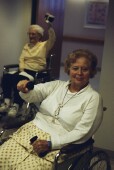| 
Testosterone Therapy May Reduce Bone Loss in Older Men
 MONDAY, April 7 (HealthDay News) -- Injections of testosterone appear to improve bone density and reduce bone loss in older men who have low testosterone levels and may help to prevent osteoporosis, a new study suggests.
Testosterone therapy has been used to improve bone strength and muscle mass in some men. However, the hormone treatment is controversial, because it has been associated with increasing the risk of prostate cancer and high levels of red blood cells. And other potential effects of long-term use of testosterone therapy aren't known.
"These preliminary data show beneficial effects of testosterone therapy on bone turnover markers in older men with low-to-normal testosterone concentrations using both continuous and monthly cycled testosterone replacement," lead researcher E. Lichar Dillon, of the Department of Internal Medicine at the University of Texas Medical Branch in Galveston, said in a prepared statement. "The effects of sex hormones on markers of bone formation are complex, but this is an important step in understanding how the process works."
Preliminary study results were expected to be presented April 7 at the American Physiological Society's annual meeting, during the Experimental Biology 2008 conference, in San Diego.
For the study, Dillon's team studied 13 men, ranging in age from 60 to 85. During the five-month trial, the men were either given weekly injections of testosterone, weekly injections of testosterone every other month, or a placebo.
The researchers found that men receiving testosterone had reduced bone turnover, compared with men on a placebo. While the effects of testosterone therapy over the long term aren't clear, the researchers said they believed the treatment would be beneficial by preserving bone mass and preventing osteoporosis.
One expert said the study was too small to prove or disprove the value of testosterone therapy in preventing bone loss and, perhaps, preventing osteoporosis.
"This small, short-term study indicates that men with low levels of testosterone respond to appropriate replacement as far as turnover markers indicate," said John Eisman, director of the Bone and Mineral Research Program at the Garvan Institute of Medical Research, in Sydney, Australia.
While calling the study "too small and too short to provide any insight into fracture-risk reduction or safety outcomes," Eisman said it does complement research he has done. "Our study showed that men with testosterone in the lowest quartile of the population had much higher risk of osteoporotic fractures," he said.
A large, long-term trial testing whether testosterone can prevent osteoporosis in men is needed to settle the question, Eisman said.
More information
To learn more about men and osteoporosis, visit the U.S. National Institute of Arthritis and Musculoskeletal and Skin Diseases.
|  |

Depression and Alzheimer's Risk Linked
 MONDAY, April 7 (HealthDay News) -- Depression appears to more than double the risk of developing Alzheimer's disease, Dutch researchers report.
Depression has been linked to an increased risk of Alzheimer's, and many have suspected that risk is tied to changes in the brain caused by depression. The theory has been that depression shrinks specific areas, leaving the brain vulnerable to the development of Alzheimer's. However, this study found that's not the case.
"We don't know yet whether depression contributes to the development of Alzheimer's disease or whether another unknown factor causes both depression and dementia," lead researcher Dr. Monique M.B. Breteler, from the Erasmus University Medical Center in Rotterdam, said in a statement. "We'll need to do more studies to understand the relationship between depression and dementia."
In the study, Breteler, and her colleagues collected data on 486 people, aged 60 to 90, who did not have dementia.
Among these individuals, 134 had had at least one episode of depression, according to the report in the April 8 issue of Neurology.
During an average six years of follow-up, 33 people developed Alzheimer's disease. The researchers found that those who had had an episode of depression were 2.5 times more likely to develop Alzheimer's compared with people who had never had depression. For people whose depression occurred before they were 60, the risk for developing Alzheimer's was fourfold greater than people who had never had depression, the researchers reported.
One goal of Breteler's research was to determine if depression causes changes in the brain that increase the risk of Alzheimer's disease, as had been suspected by other scientists.
Researchers have proposed that depression leads to a loss of cells in the areas of the brain called the hippocampus and the amygdala, thereby increasing the risk for Alzheimer's. However, Breteler's group didn't find any difference in the size of those areas of the brain in people with or without depression.
In addition, Breteler's team found that people who had symptoms of depression at the start of the study were no more likely to develop Alzheimer's than those who did not have the symptoms.
Even though the study found a connection between depression and Alzheimer's, experts continue to debate whether such a connection really exists.
"There are quite a few papers about the association between depression and Alzheimer's, with conflicting results," said Yaakov Stern, a professor of clinical neuropsychology at Columbia University in New York City. "No one really knows if there is a connection between depression and Alzheimer's."
Another expert questioned whether treating depression could prevent dementia.
"Depression may be a risk factor for developing dementia. I believe that's true," said Dr. Gary Kennedy, director of geriatric psychiatry at Montefiore Medical Center in New York City. "Depression is also one of the side effects of dementia.
"So there is an overlap relationship that makes it very difficult to look at the more interesting question of whether, if we treat depression could we prevent dementia," Kennedy said.
Kennedy noted that studies have shown that depression in older people appears to be an early sign of developing dementia. However, whether that's the beginning of dementia or an independent risk factor for dementia isn't known, he said.
Even though the clinical implications for the association between depression and dementia aren't clear, Kennedy believes that older people with depression should have their depression treated. "There's even more reason to make sure depression is aggressively treated," he said.
Adding to the debate about the relationship between Alzheimer's and depression, a paper in the April issue of the Archives of General Psychiatry also suggests that that depression may be a risk factor for Alzheimer's.
In the study, Robert S. Wilson, of Rush University Medical Center in Chicago, and his colleagues found that among 917 older men and women, those who had symptoms of depression at the beginning of the study were more likely to develop Alzheimer's.
"Understanding the mechanisms linking depressive symptoms with dementia could suggest novel approaches to delaying dementia onset, because animal research suggests diverse means by which the adverse effects of chronic stress may be modified," Wilson's team wrote.
More information
For more on Alzheimer's disease, go to the Alzheimer's Association  . .
|  |

Painkillers Boost Muscle Mass Among Weight-Training Elderly
 SUNDAY, April 6 (HealthDay News) -- A daily dose of either ibuprofen and acetaminophen appears to boost both muscle mass and strength among elderly men and women who do weight training.
"It's surprising," said principal investigator Todd A. Trappe, an associate professor with the Human Performance Lab at Ball State University in Muncie, Ind. "But the bottom line is that you would have to search pretty long and hard to find anything that would demonstrate the strong and positive effect on muscle growth that we observed. And I certainly don't think you're going to find it in anything that's non-prescription."
His team was to present its research April 6 at the Experimental Biology annual meeting, in San Diego.
The finding stems from an earlier study the team conducted on the short-term impact of ibuprofen and acetaminophen on muscle metabolism among young men and women who lifted weights over a 24-hour period. The impact here was negative, as the two drugs were found to have blocked the workings of an enzyme known as Cox and inhibited the adding of new protein to muscle.
"So we thought we needed to look at this long-term and among older people, who are more likely to be taking these drugs chronically for pain and other reasons, because we're trying to tell them that they need to be more active as they age, yet there may be an interfering effect here," Trappe said.
To explore the question, the researchers tracked 36 men and women between the ages of 60 and 78 for who enrolled in a three-month regimen of knee-extensor weight training at the Human Performance Lab.
Training intensity and duration -- 15- to 20-minute sessions three times per week -- was set at a level known by the researchers to prompt significant muscle mass and strength growth in a participant's quadriceps muscles, in the absence of any medication.
In conjunction, the participants were randomly divided into an acetaminophen group, an ibuprofen group or a placebo group.
The two drugs were consumed at recommended daily dosage levels, as noted on current over-the-counter packaging.
To the research team's surprise, an analysis of muscle tissue samples taken before and after revealed that while the placebo group experienced a 7 percent growth in muscle mass and strength, those taking either acetaminophen or ibuprofen experienced an even greater gain -- 40 percent to 60 percent more.
Trappe theorized that the two drugs could be provoking the body to overcompensate for an initial blocking of the enzyme any muscle needs to grow -- prompting muscles to send out fresh and powerful signals demanding even more enzyme than the body would normally produce.
"But as of now, we just don't know," Trappe said. And he cautioned against anyone running out to down over-the-counter drugs of any kind before further research is conducted.
In the meantime, David Bassett Jr., a professor of exercise science at the University of Tennessee in Knoxville, hailed the reputation of the physiology lab that conducted the research and described the finding as "within the realm of believability."
"A 7 percent increase in strength and mass based on resistance training alone doesn't strike me as that great of a gain, relative to other similar studies," he noted. "But I do think it is a new and pretty significant finding that these two drugs would bring about a greater increase than otherwise."
"It's important," Bassett added, "because some even make the case that resistance training among the elderly is almost more important than aerobic training, because weight training can significantly improve functional strength and the ability to carry out the activities of daily independent living."
However, Bassett pointed out that despite the apparent absence of serious side effects, one study is not enough to conclude that ibuprofen and acetaminophen really do confer such muscle gain benefits.
"There's probably no harm taking them, but there also may be no benefit either," he said. "It's still up in the air, and it will be necessary to verify these findings with further research. But if it holds up, it is potentially something that many people would want to try."
More information
For details on exercise and the elderly, visit the American Academy of Family Physicians  . .
|  |
|